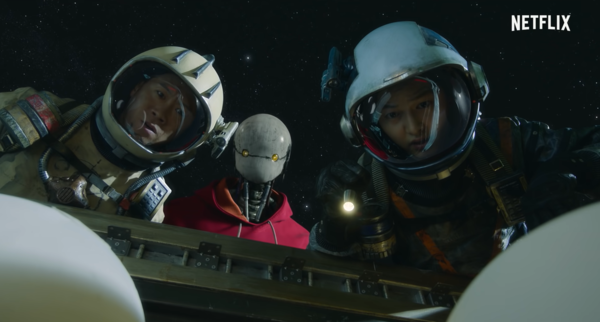As Korea’s first venture into space blockbusters, the film Space Sweepers could only ever have been met with high expectations. Fresh off Parasite’s multiple wins at the Academy Awards a year before as well as riding the Hallyu wave that continues to sweep across the globe, all eyes were on the lucrative Korean film industry and their attempt at a genre that has long been dominated by and associated with Hollywood. Now that Space Sweepers has been released on Netflix worldwide, what’s the verdict?

In classic space Western fashion — reminiscent of Guardians of the Galaxy and Firefly — Space Sweepers features a crew of misfits aboard the spaceship Victory, each with their own agenda, brought together by circumstance and necessity, and seemingly not getting along very well. It’s a tried-and-true formula for an enjoyable dynamic, and it works charmingly due to the actors’ great chemistry with one another. Song Joong-ki, one of Korea’s most famous actors worldwide, stars as Tae-ho, the Victory’s ace pilot, alongside Kim Tae-ri as the reticent Captain Jang. Other members of the crew are Tiger Park, played by Jin Seon-kyu, and the humanoid robot Bubs, voiced and performed by Yoo Hae-jin through motion capture. Each character has a personality that clashes with everyone else’s, but amidst the squabbles, a genuine sense of camaraderie can be felt — one of the film’s high points.
Another aspect of the film that deserves praise is the visual effects, which plays an extremely important role in a science fiction flick set in space. Several scenes involve spaceships racing and hurtling towards one another against a backdrop of stars and planets and lasers and explosions, and all of this is expertly produced by Korean VFX company Dexter Studios. And although Bubs is a robot without an expressive face, he is animated based on Yoo Hae-jin’s performance that allows the character’s personality to manifest. Space Sweepers easily disproves any doubt that only Hollywood and the West can make space movies with high quality VFX.
But a movie that looks good is not necessarily a good movie altogether, and Space Sweepers certainly has its drawbacks — most of all in its writing. With all its ambition, the film’s plot falls flat and, at times, becomes too incoherent. Some moments in the film also drag along without a clear reason for not being left in the cutting room floor. While the crew has an interesting group dynamic, their individual arcs aren’t nearly as interesting to watch — for the characters that even have one. Captain Jang, for instance, could have been compelling (and Kim Tae-ri lacks no talent) but was seemingly sidelined for most of the climax. Not to mention the film’s villain was too underdeveloped and turned into an incomprehensible cliché before being conveniently done away with, along with the rest of the conflict being wrapped up in a neat little bow.
All that being said, Space Sweepers is still an enjoyable movie, especially when you’re just stuck browsing through Netflix looking for something to watch that’s not too heavy and has plenty of spectacle and humor. When it comes to the genre of science fiction and all its potential, Space Sweepers doesn’t bring much of anything new to the table. But a lot of — in fact, arguably most — Hollywood space blockbusters are like that, too. Space Sweepers was expected to contend with Hollywood’s best, but it ended up being more like Hollywood’s usual.
Some people may find the movie disappointing, but much of that disappointment could be a product of the high expectations and the “hype” that come with being Korea’s first space movie. Yes, Space Sweepers had a lot of wasted potential, making it an average movie at best. But for a first shot at this genre, is average such a bad result after all? South Korea has now gone as far as proving that it can make a space blockbuster that looks good — which, when it comes to space blockbusters, makes or breaks a movie. All that is left to do is to make one with a captivating story that pushes boundaries and subverts expectations. Space Sweepers wasn’t that, but Korea has no shortage of creative filmmakers capable of thought-provoking stories in other genres. Now, great expectations abound once more, for if Space Sweepers has accomplished anything, it has hopefully opened the doors of unexplored genres like the space blockbuster for Korean filmmakers, populating global cinema with more voices and perspectives than Hollywood’s alone.

